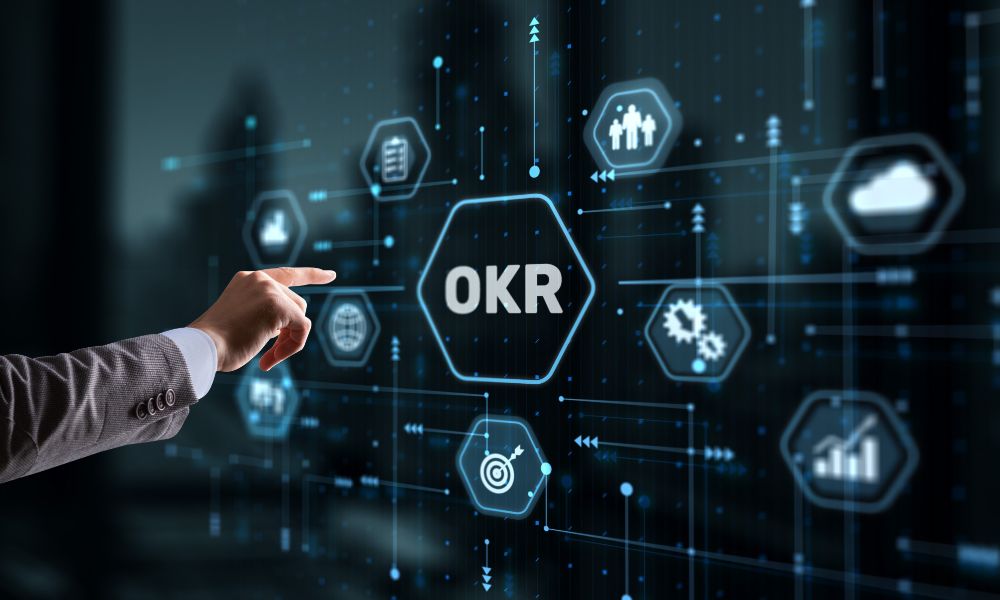Unlock the untapped potential of your OKR management with AI – 5 groundbreaking trends reshaping the future!

Table of Contents
- AI-powered analytics
- Personalized goal setting and recommendations
- AI-enabled performance monitoring
- Intelligent OKR alignment and prioritization
- Future implications and potential challenges
- Conclusion
In today’s fast-paced business world, organizations constantly seek ways to enhance productivity, align teams, and achieve strategic goals. One popular methodology that has gained widespread recognition is the OKR (Objectives and Key Results) framework. OKR tools provide a structured approach to goal setting and tracking, enabling companies to focus on their most critical objectives and measure progress effectively.
With the advent of artificial intelligence (AI) technologies, OKR management is experiencing a significant transformation. AI-powered tools are revolutionizing how organizations set and manage their OKRs, bringing advanced analytics, personalized recommendations, performance monitoring, and intelligent alignment.
AI-powered analytics
One of the key trends in AI-supporting OKR tools is the integration of advanced analytics capabilities. AI algorithms enable organizations to process and analyze vast amounts of data, providing valuable insights for more informed decision-making.
By utilizing machine learning algorithms, OKR tools can offer predictive insights, helping organizations identify potential trends, risks, and opportunities associated with their objectives. Real-time tracking of key performance indicators (KPIs) and progress is another vital aspect of AI-powered analytics, ensuring transparency and timely adjustment of strategies.
Automated data collection and integration further streamline the OKR management process. These tools eliminate the need for manual data entry, minimizing human error and saving valuable time. They can also integrate data from various sources, such as project management systems, CRMs, and financial software, providing a comprehensive view of performance and enabling more accurate analysis.
Personalized goal setting and recommendations
A significant benefit of AI in OKR management is the ability to personalize goal setting and provide intelligent recommendations. AI-driven OKR tools analyze historical data and patterns, helping organizations identify areas of improvement and suggest potential goals.
These AI-powered suggestions consider individual preferences and team dynamics, facilitating goal alignment and collaboration. Adaptive goal recommendations ensure that objectives are tailored to each employee’s skills and aspirations, creating a sense of ownership and motivation to achieve the desired outcomes.
AI-enabled performance monitoring
Monitoring and evaluating performance are fundamental aspects of OKR management. AI-enabled tools take performance monitoring to the next level, offering real-time feedback and insights.
Automated performance tracking allows organizations to continuously assess progress, identify areas of improvement, and provide timely feedback. Through AI algorithms, these tools can detect patterns and trends, enabling proactive adjustment of strategies and alignment with business objectives.
AI-powered OKR tools also leverage data-driven alerts to flag potential bottlenecks and risks. By highlighting potential challenges early on, organizations can take necessary actions to mitigate risks and stay on track.
Intelligent OKR alignment and prioritization
Aligning objectives across different teams and prioritizing them based on impact and feasibility can be complex. This is where AI plays a vital role in supporting OKR management.
AI algorithms enable dynamic objective alignment, helping organizations maintain team synergy and ensure that objectives align with the business strategy. By automating this process, OKR tools save time and reduce the risk of misalignment or conflicting goals.
Additionally, AI-powered tools aid in prioritizing objectives based on their potential impact and feasibility. By utilizing sophisticated ranking algorithms, these tools help organizations allocate resources effectively, ensuring that the most critical objectives receive appropriate attention and resources.
Future implications and potential challenges
While AI holds tremendous potential for transforming OKR management, there are considerations that organizations must keep in mind. Ethical considerations are crucial, especially when using AI-driven OKR tools.
Image courtesy of via Google Images
Fair and unbiased algorithms are necessary to ensure that recommendations and assessments are free from discrimination. Organizations must also be aware of privacy and data security concerns when leveraging AI for OKR management.
AI is expected to play a more significant role in innovation within OKR management. The ability of AI-powered OKR tools to enhance goal attainment and facilitate continuous improvement is a promising area of exploration.
Conclusion
The trends in AI-supporting OKR tools are revolutionizing how organizations approach goal setting, tracking, and alignment. With advanced analytics, personalized recommendations, advanced performance monitoring, and intelligent prioritization, AI is shaping the future of OKR management.
Embracing AI-driven OKR tools can give organisations a competitive edge, enhancing efficiency, and effectiveness. Organizations must stay abreast of the latest trends as technology evolves to leverage their full potential and drive successful goal achievement.
